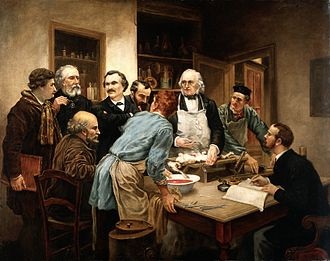 |
| Oil painting
depicting Claude Bernard, the father of modern
physiology, with his pupils. |
Physiology
Physiology (/ˌfɪziˈɒlədʒi/; from Ancient Greek φύσις (physis)
'nature, origin', and -λογία (-logia) 'study of') is the
scientific study of functions and mechanisms in a living
system. As a sub-discipline of biology, physiology
focuses on how organisms, organ systems, individual
organs, cells, and biomolecules carry out the chemical
and physical functions in a living system. According to
the classes of organisms, the field can be divided into
medical physiology, animal physiology, plant physiology,
cell physiology, and comparative physiology.
Central to physiological functioning are biophysical and
biochemical processes, homeostatic control mechanisms,
and communication between cells. Physiological state is
the condition of normal function, while pathological
state refers to abnormal conditions, including human
diseases.
The Nobel Prize in Physiology or Medicine is awarded by
the Royal Swedish Academy of Sciences for exceptional
scientific achievements in physiology related to the
field of medicine. |
|